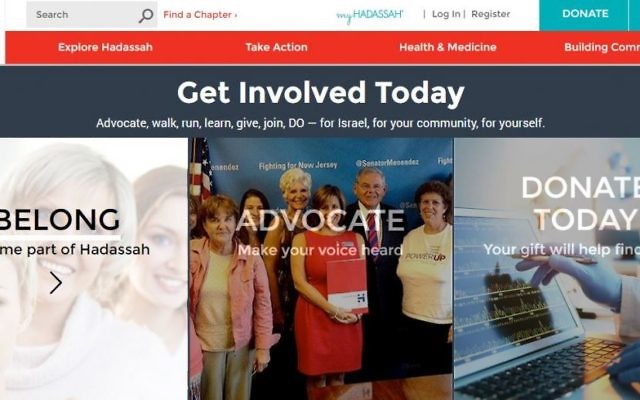Jewish Call to Action for Women’s Health
As American Heart Month nears its end, Hadassah emphasizes the need for equality in medical policies.
Women are the heartbeat and lifeblood of America. As mothers, wives and daughters, we are caregivers and decision-makers — not only nurturing our families, but also strengthening the economy and future of our nation.
Women are 10 times more likely to die from a heart attack than from breast cancer. Heart disease is the leading cause of death for women, killing more than all cancers combined. Yet many don’t know that heart disease risk factors and symptoms differ for men and women, with real consequences.
I know women who delayed treatment because they didn’t realize they were having heart attacks or were turned away from ERs because doctors assumed their symptoms were the result of stress.

Within one year of a heart attack, 76 percent of men survive, compared with only 58 percent of women. More women are dying from heart disease, and many other illnesses, because of persistent gender disparities in research and treatment. That is why we cannot be complacent.
Health — including women’s health — is not a partisan issue. Jewish law commands us to save lives, pikuach nefesh, even if that means breaking other commandments.
Women’s health has always been an integral part of Hadassah’s mission in Israel and here in the United States. Members of the Jewish community have an important role to play as champions for women’s health and equitable care for all.
February is American Heart Month. Each of us needs to make sure the women in our lives are taking care of themselves.
One-quarter of all women, regardless of income, reported that lack of time was the reason they went without care, according to a Kaiser Family Foundation study. Think of what that means when 82 percent of heart disease cases are preventable.
Free, annual well-woman visits, including blood pressure checks, diabetes screening and nutrition counseling, are essential for women’s heart health. When it comes to prevention — and access — we’re watching the Affordable Care Act closely. Whatever your view about other proposed changes to the law, the Jewish community must stand firmly united behind the key provisions that help millions of American women, including mandatory maternity coverage.
We cannot remain silent when we face the real possibility that insurance companies will again legally charge women more for basic insurance, adding riders for pregnancy and screening options.
We must ensure that all current preventive coverage remains intact, such as guidelines for mammograms and breast cancer genetic counseling and testing, including for BRCA1 and BRCA2, which are of particular relevance to the Jewish community.
Like so many other Jewish and women’s advocates, I care deeply about what happens to contraceptive coverage and access to reproductive services. At the same time, we must recognize that a woman’s health is about far more than her reproductive cycle; it’s about her lifecycle.
Women respond differently to many drugs and medical devices. It has been 30 years since the ban on women in clinical trials was lifted, yet we still make up only a third of cardiology research subjects. We must call on the new administration and Congress to provide robust support for the Office of Women’s Health, which coordinates women’s medical and public health research.
Building on the passage of the 21st Century Cures Act in December, we must also urge our officials to advance policies to ensure safe, effective and equitable research, such as the bipartisan Research for All Act. Last term, Hadassah members advocated to help secure six legislative co-sponsors.
We advocate not only for ourselves, but also for our daughters and granddaughters. When we pass the torch from generation to generation, l’dor vador, we must ensure a healthier future for those to come.
Now is the time for all of us to act and let our collective voices be heard. When we say l’chaim (to life), let’s reaffirm that women’s and men’s lives are valued equally and commit, as the Jewish community, to advance women’s health and gender equity in medicine.
L’chaim.
Ellen Hershkin is the 26th national president of Hadassah, the Women’s Zionist Organization of America, which founded the Coalition for Women’s Health Equality in 2016.




comments